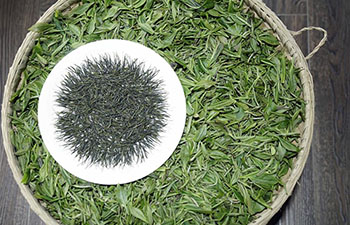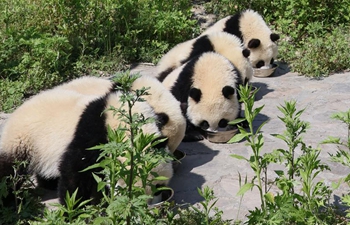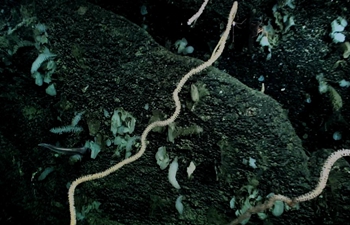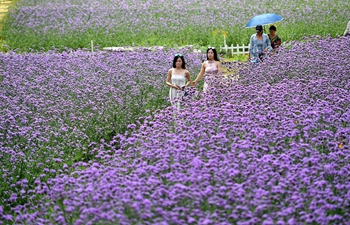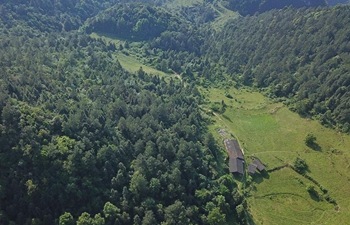 ?
?A man packs "Feneos", at her local shop in the settlement of Gkoura in Corinth, some about 70 Km west of Athens, Greece, on May 16, 2018. In the highlands of Corinth prefecture at the Peloponnese peninsula, just two hours from Athens, local agricultural small businesses turn to extroversion to survive the economic crisis. To go with Feature: Greek agricultural community more extrovert in seeking business opportunities. (Xinhua/Marios Lolos)
by Alexia Vlachou
MOUNTAINOUS CORINTH, Greece, May 19 (Xinhua) -- In the highlands of Corinth prefecture at the Peloponnese peninsula, just two hours from Athens, local agricultural small businesses turn to extroversion to survive the economic crisis.
Exports of agricultural products are accounting for one-third of total exports in Greece. According to Eurostat, Greek exports during the preceding year reached a value of 28.8 billion euros (34 billion US dollars), an increase of 13 percent year over year.
Surrounded by the sea, with long valleys and lavish mountains, the broader area of Corinth is land to many delicious products, like raisins, citrus fruits, olive oil, dairy products and traditional pulses.
Though agriculture sector, which contributes 4.1 percent of GDP, is characterized by small farms and low capital investment, local people in business step up their efforts to upgrade the facilities and services to be competitive in the international market.
Third generation cheese maker, Markos Leggas continues his family business founded in 1936 by his grandfather. After years of continuous efforts, he has managed to make his products like feta cheese, and other dairy products popular from Norway and France to the United States and New Zealand.
"In the last five years, we had a 50 percent drop in retail, a 20 percent in wholesale and our profit rate decreased dramatically. For that reason, we try to seek opportunities abroad," Leggas told Xinhua during a visit at his premises recently.
"We started four years ago due to the economic crisis. Exports are the only way," he noted.
"Our exports consist of a 10 percent of our production. We hope to reach a 50 percent in the coming years," he added.
Running 24 hours seven days out of a year, the life of a cheese maker is not an easy one.
"We process 2,500 tons of sheep's and goat's milk from the mountain area of Corinth, Feneos, and Stymphalia. Milk can be classified as organic, as it is produced from the milk of free-ranging animals. Due to the unique micro-climate of the area, they have a delicate taste," he stressed.
For Leggas, tradition and technology must be in harmony. His facilities are among the most modern in Greece with state-of-the-art sanitary conditions, he stresses.
"Our products carry the traditional recipes that we keep within the last three generations in our family," Leggas said.
Regarding the competition, the Greek products are very high in quality, but they lack in price as they are more expensive, according to the cheese maker.
"In Bulgaria or in Denmark they use cow milk which is cheaper, we use goat and sheep milk which is twice the price of the cow," he noted.
Local products are a way out also for elder people who return to their hometown after pension and want to offer more.
Anna Dari, a pensioner, moved from Athens to settlement Gkoura on the western slopes of Mount Ziria with her husband to cultivate legumes and herbs.
"In the region, across 20,000 hectares, PDO pulses are grown, including Feneos 'vanilla beans', yellow split peas (fava in Greek), lentils and other pulses.
Products of Protected Denomination of Origin (PDO), give extra value, farmers acknowledge people's preference and continue to cultivate them under better conditions," she explained to Xinhua.
George Gioulis is a pioneering figure in organic viticulture and produces organic wines from varieties like sauvignon blanc, Sauvignon Gris, Chardonnay, cabernet sauvignon and Agiorgitiko, at an altitude of 800 meters in the village Klimenti in the steep slopes of the mountain Ziria close to the lake Stymphalia.
"Exports reach a 30 percent of our production. We always try in exporting, some attempts went well and some others not. We have perfect collaboration with USA, Germany and Canada," he told Xinhua.
In Greece, the economic crisis has hit wine production and the sector's growth.
"The internal market dropped by 80 percent within the last years. But we see a positive turn by the tourism growth. We work a lot with the Greek islands like Corfu, Crete, Mykonos, Rhodes due to the increase of tourists," he said.
According to Gioulis, who runs the winery with his son and his daughter, they want to reach a level of 50 percent exports and 50 percent wholesale in Greece.
Though tourism shows some positive signs, still winemakers like other small, medium enterprises face difficulties with the banks due to capital controls.
"The sector needs technical assistance and investment. We have entered the foreign market, but we need support ... to be able to help our economy," he stressed.
In line with Gioulis, the deputy mayor of the seaside town Xilokastro Panos Kalivas agrees that in export trade things need to be more straightforward regarding the bureaucracy and the customs offices.
"Our municipality has made a great effort to promote and export local agricultural products like olives and citrus fruits in China, in East and Europe," he stated.
Recently, a Chinese delegation from the city of Longquan, east China's Zhejiang Province, visited Xilokastro and reached a preliminary cooperation consensus with the mayor. The two cities are planning to sign a sister city agreement in the future.
"Greece imports significantly more food and beverages than it exports. And it is a pity in this blessed country which produces so many good quality products not to export them," Kalivas said. (1 euro= 1.18 U.S. dollars)








